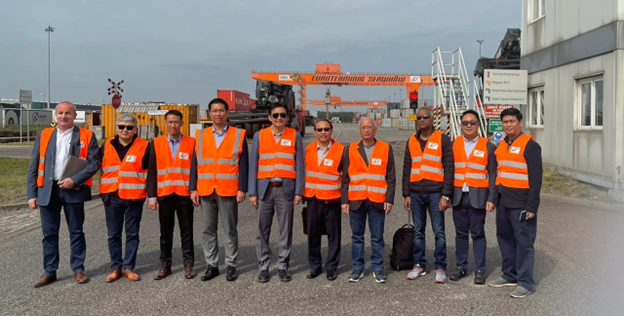Promoting a shift towards sustainable freight transport in the Asia-Pacific region (ESCAP)
 This project focused on supporting four countries in the Asia-Pacific region to adopt sustainable freight transport policies. Recognizing its importance, the national sustainable freight strategy has been under consideration in many countries and governments have been taking tangible steps to ensure more sustainable freight transport. Under this project, all four pilot countries—Bangladesh, Sri Lanka, Uzbekistan, and Fiji—carried out national assessments on sustainable freight transport followed by national consultations that led to the development of the draft sustainable freight transport strategy for these countries. These countries then shared the results of this work during several ESCAP intergovernmental meetings, including the sessions of the Committee on Transport, the Working Group on Trans-Asian Railway at its eighth meeting and the Fourth ministerial Conference on Transport in December 2021 supporting the push for greater regional cooperation on this issue.
This project focused on supporting four countries in the Asia-Pacific region to adopt sustainable freight transport policies. Recognizing its importance, the national sustainable freight strategy has been under consideration in many countries and governments have been taking tangible steps to ensure more sustainable freight transport. Under this project, all four pilot countries—Bangladesh, Sri Lanka, Uzbekistan, and Fiji—carried out national assessments on sustainable freight transport followed by national consultations that led to the development of the draft sustainable freight transport strategy for these countries. These countries then shared the results of this work during several ESCAP intergovernmental meetings, including the sessions of the Committee on Transport, the Working Group on Trans-Asian Railway at its eighth meeting and the Fourth ministerial Conference on Transport in December 2021 supporting the push for greater regional cooperation on this issue.
Moreover, synergies were created with another United Nations Development Account project entitled “Trade and transport connectivity in the age of pandemics,” resulting in a series of forecasts on sustainable freight operations in Asia in the post-pandemic era, prepared in cooperation with the International Transport Forum and disseminated in countries through a series of three sub-regional workshops. Furthermore, a capacity building activity on rail digitalization was developed for and implemented together with the International Union of Railways (UIC). This included development of e-learning material on accelerating rail digitalization transformation in the region to support a shift to sustainable freight transport and the organization of three capacity building workshops to expand the knowledge of policy makers to digitalize rail freight for more sustainable freight transport in the Asia and Pacific region. A proposal for a regional approach to enhancing the sustainability of freight transport in Asia and the Pacific was presented at the meetings of the Working Groups on the Asian Highway Network, on the Trans-Asian Railway Network and on Dry Ports held in 2021. The Working Groups welcomed the regional approach and requested for the issue to be placed before the 4th Ministerial Conference on Transport.
A major contribution of the project to the objective of promoting sustainable freight in the region was the formulation and eventual adoption of Strategy 2030 on Accelerating Rail Digital Transformation in Asia-Pacific. Reflecting the resilience of the rail transport demonstrated during the pandemic and the need to further support the observed push towards digitalization of rail operations, the project organized a high-level conference on accelerating rail digital transformation in New Delhi in April 2023. The event organized together with Indian Railways deliberated on a regional strategy to accelerate rail digital transformation, and based on these recommendations, the strategy was adopted by the Working Group on Trans-Asian railway at its eighth meeting held in September 2023. The implementation of the strategy has potential to make rail more competitive and pave the way for more climate friendly transport, supporting the realization of the SDGs. Another key achievement of the project relates to the adoption of a new annex to the intergovernmental agreement on Trans-Asian Railway on guiding principles for electronic information exchange between railways and among railways and control agencies. This was, in part, due to project activities undertaken to promote railway transport, particularly, on rail digitalization. The digital exchange of information among stakeholders at the rail border crossing would lead to more efficient processes at railway border crossings. The annex was adopted at the eighth meeting of the Working Group of Trans-Asian Railway held in September 2023. The adoption and its eventual acceptance would lead to harmonization of digital information exchange practices among railway stakeholders leading to more competitive railway transport and encouraging a modal shift towards rail, leading to more sustainable transport.
In addition, at the last stage of the project, in November 2022 a specific high-level request was received from the Government of the Lao People’s Democratic Republic for capacity building on strengthening railway transport on the back of the operationalization of the Lao-China rail link for more sustainable freight transport in their country. ESCAP supported the Lao People’s Democratic Republic to strengthen its international railway transport by assisting it to join the Organization for Cooperation Between Railways, including facilitating ministerial level field visits from the Lao People’s Democratic Republic to international rail border crossings for a better understanding of the requirements of international railway transport. A Capacity Building Workshop was organized in Vientiane, Lao People’s Democratic Republic in June 2023 to share experiences of other countries including outstanding challenges and ways to address them to harness the full potential of the Lao-China railway link for more sustainable freight transport across the ASEAN countries. By providing substantive support to the Lao People’s Democratic Republic, an LDC and LLDC, to move towards sustainable freight, the project promoted the principle of leaving no one behind.